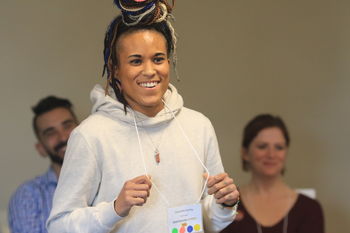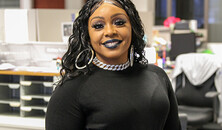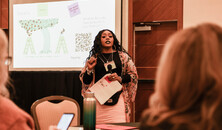My Black Timeline

My Black Timeline
By Charlotte Lartey
Washougal Education Association
Washoughal High School
1990’s. Provo, Utah.
My mom and dad’s interracial marriage was the scandal of the Mormon century, and my whole childhood is full of people struggling with the belief that all these brown kids came out a white woman.
I remember going to the store with my mom, and people would stop us to ask her, “Where did you get those black children?” and “How much did your children cost?”
I have an early memory of finding my sister screaming in pain, standing in the bathtub trying to bleach her skin so that girls at school would stop calling her “ugly” and “evil”. Another contributing factor to this incident was when our next-door neighbor approached us in our backyard and she told us we “would never rid the devil of our black skin”. We were just 4 and 5 years old.
In Kindergarten, my principal tried to suspend me after a playground incident. I found my sister crying because a girl wouldn’t let her go down the slide. She stood at the bottom yelling “No brown girls are allowed on the slide!” I explained to my dad that I went down the slide anyway, she refused to move out of the way and my feet kicked her face. I don’t know what my dad said to Mr. Roper, but I was escorted back to class.
The only other physical altercation I’ve ever been in was when one of the neighbor boys called my little brother a nigger. I gave him a black eye and he smirked about that for weeks. I was 11 or 12 and I cried for days not understanding why this boy was happy that I punched him. My dad and I discussed alternative ways to resolve my anger about our neighbors.
It wasn’t long after that, that same neighbor boy tried to stab me repeatedly with a massive needle and he told me to die. I could outrun every boy in the neighborhood including him. I got away from him while bleeding from a pinhole scar 3 inches below my heart. When parents went next door to talk, the neighbors locked themselves inside and refused to answer the door.
For a lot of years people told me I looked like a boy. I would walk in a public restroom and white ladies would stare at me and say I was in the wrong bathroom and I needed to leave. They had never seen a little black girl with an afro, I guess.
2000’s. Utah County.
When my youngest sister was playing outside, one of the younger neighbor boys threw a big rock at her face and ran away. She was bleeding around her eyes and almost needed stitches. My dad immediately went to their house to talk to their father, who was our Mormon bishop. He was home; they were all at home. But they refused to answer their door. Again, and again and again they avoided confrontation and they have never been held accountable by anyone in our neighborhood.
When my baby sis was in elementary school, that same boy made everyone laugh with the joke, “Why does Beyoncé sing, “to the left, to the left”? Because Black people have NO RIGHTS!” She cried for hours because she didn't understand why it was funny. He later gave her the nickname “Fatty Addy”, and he used it so often, it followed her to high school.
When I was in junior high, kids used to try and make their handprint in my afro or try to make my afro bigger or smaller. Or stick pens or pencils in it and laugh behind my back. I had to carry around hair supplies to maintain my afro because people messed up my hair all throughout the day in my various classes.
In 9th grade, for an entire year, whenever I walked into a class one of my friends would yell “Look out everyone! There is a black person in the room!” Even my math teacher laughed.
Throughout college, while I was in the education program, the head of the department was a professor who targeted me for more than two years. I filed complaints that resulted in an unsupervised meeting between her and me where she told me she would make sure that I never became a teacher. After I graduated I didn’t get my teaching license and it took me two weeks of calling UVU’s various departments before they traced the issue back to a written request to have my name removed from the list of graduates that year, signed and submitted by that same professor. I had to re-apply for and repay the licensing fees, and then I had to wait almost 6 months before I could be issued a teaching certificate and I couldn’t apply for any jobs until then. Everyone else from my graduating class found teaching jobs in their preferred areas.
I had 14 teaching interviews in Utah County, including a job interview at the high school I graduated from, where I had two siblings currently attending. I kept being told I wasn’t quite what their community was looking for but I was encouraged to keep applying for teaching jobs at other schools because I would “surely find the school that would be the right fit for me.”
One time I bought a filing cabinet at Deseret Industries, and the cashier nodded when I asked if I could use the dolly to take the filing cabinet out to my car if I brought it right back. I was stopped in the parking lot by a middle-aged white man in plain clothes, who told me he was security for DI, and a police officer for American Fork. He took me back inside DI and kept me in a room for 2.5 hours, interrogating me about my attempts to steal this rusty old dolly. He said he knew when I came in that I was there to steal, and he called me “a really horrible liar.” When the actual police arrived, the cashier eventually told them that the dollies are stationed next to the filing cabinets for that purpose, and then the guy had to let me go. That was the closest I have ever been to being arrested, I realized that I am the most privileged black person that I know.
2011, Early Educator, Utah
I was attending a back-to-school AVID training in a conference room, and I was freezing so I put my hoodie over my head and stuck my hands in my pockets. A teacher at my school who I learned was my local union president, yelled to me from two tables over “Hey Charlotte, take your hoodie off! You look like Trayvon Martin!” That racist remark went unchecked by everyone who knew about it until I finally confronted her myself, while we were at an anti-racist training that she had been forced to attend. She apologized in person and via email later that day. Apologies can be nice. But what would be really nice, is if we lived in a world where a black person can feel comfortable wearing a hoodie.
My first-year teaching at Jordan high, during my first week of school, a student scratched “nigger” into my classroom door. The custodians had to sand it off my door.
My second year, I walked into my classroom one morning and found “LARTEY HAS EBOLA” written in large letters across all my whiteboards.
Another time, I was called to my principal’s office during my prep period because I had sent him an email to let him know that he created a hostile environment in my classroom when he announced over the intercom “ATTENTION! There is a group of HISPANIC BOYS who are tricking people into eating ghost peppers. These are dangerous and can send you to the hospital so if you see any of these Hispanic boys, report them immediately!” He called me to his office just to yell at me for 25 minutes about the evidence that proves that he is not racist and all the reasons that he will not stand for me calling him a racist. I tried to get up and leave multiple times and he yelled “Sit down Charlotte! I am not done talking to you!” I thought for sure one of his secretaries would hear him and would come and let me out … I felt trapped, but I had to sit there until he was done screaming at me, and when he was done, I was not invited to respond, but excused to leave. So I did, and I cried in between my classes the rest of the day.
2016- M.Ed from Southern Utah
For my master’s thesis I developed and conducted a research study on fostering resilience to close the opportunity gap for at-risk youth. I taught AVID and used our students as my subjects. It took a whole year to plan and write the first three chapters of my thesis and get it all approved from my school, guardians, and SUU. When I applied for my last capstone class in the spring, I wasn’t approved to register and couldn't figure out why until my grades were released. We needed to maintain B’s to stay in the graduate program and my previous professor had given me a B-, at 79%. I was told to take the class again, and I would need to postpone my research project for the following school year in the fall. I was able to work out a deal with the professor, who agreed to raise my grade the 1 percent I needed, if I wrote three-page papers to fully explain my writing process for each of the three chapters of my thesis. He said that my chapters were well written, but he was not convinced that the writing process was mine, and it caused concerns about my “professionalism”, and my ability to conduct my own research study. I stayed up all night to write the papers that explained everything I read and all my thoughts about my own thesis chapters, and I turned in nine pages the very next day. It still took him almost two weeks before he made the grade change and by the time I was approved and in my capstone class, I had an entire month less than everyone else in my cohort to complete and publish my thesis project. It was pushed so far back, I defended my thesis to their board the day before my graduation ceremony (which I didn’t bother attending because I could barely feel celebratory in this massive personal achievement, because I was overly consumed with the relief that came from finally conquering my last educational obstacle). I was so exhausted, I never celebrated earning my master’s degree.
A few years ago, in April, a friend of mine passed away. I left the hospital and drove home to Salt Lake around 3 a.m. and I was followed by a police officer for six miles before he exited the freeway with me, pulled up beside me, looked at me, slowed way down to get behind me, and then pulled me over right by Smith’s ballpark, just a half a mile from home. His first words were “Is this your car?” I was having a bad night, I was exhausted, and I had a lot of words for this ass of a cop, pulling me over in the middle of the night for no reason. But I remembered what my parents taught me. I left twenty minutes later with no ticket, and a warning to do something about my license plate not being visible in the dark.
Last year, one of my colleagues visited Rose Park Junior high in Portland and then came to find me just to tell me that I should go look for a job there because I'd probably fit in so much better in a school with more black people.
It’s 2020
My black timeline is not over yet because I have lived a privileged life with two extraordinary parents, and access to educational opportunities. I have been equipped with a variety of protective factors that allow me to thrive in this world of racial intolerance. I have had to become a master of my own emotional regulation, stress resilience, conflict resolution, and interpersonal communication skills as if my life depends on it, and I do believe my black life depends on these things. My black students today, are still being called niggers at school and on the bus, they are still being discriminated against by their peers, their teachers, and by our educational system. My black timeline expands 30 years, but I have changed a lot more than our world has.
THE BLACK TIMELINE is a history of painful experiences, obstacles, intolerance and injustice that started over 400 years ago and it continues onto today, tomorrow, and everyday hereafter.
For so many of my brothers and sisters, this black timeline has been ripped apart and cut way too short.
For so many of my brothers and sisters, this black timeline might as well be cut short because we never asked for this plague of difficulty, disparity, death, and consistent grief.
I think people forget that the end stage of grief is the feeling of hope. The problem is that hope gets lost in the depths of the black timeline. Even though I know how important it is to have hope, I have to dig really, really deep to find it. And I have to try even harder to convince the younger generation that it exists, and that I know it’s there, even though they can’t see it and I can’t show it to them. And I have to try even harder to convince myself that I don’t have to feel it all the time to know that it’s there, I just have to believe it is. My black timeline makes it really difficult, but I mean, it has always been this way.


